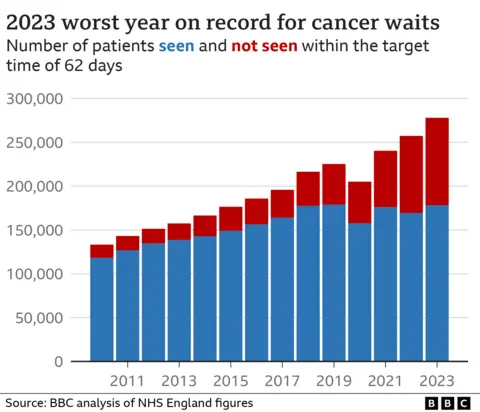Cancer waiting times in 2023 worst on record in England
 Getty Images
Getty ImagesCancer waiting times for 2023 in England were the worst on record, a BBC News analysis has revealed.
Only 64.1% of patients started treatment within 62 days of cancer being suspected, meaning nearly 100,000 waited longer than they should for life-saving care.
The waits have worsened every year for the past 11.
Macmillan Cancer Support chief executive Gemma Peters called the figures "shocking".
"This marks a new low and highlights the desperate situation for people living with cancer," she said.
"Behind the figures are real lives being turned upside down, with thousands of people waiting far too long to find out if they have cancer and to begin their treatment, causing additional anxiety at what is already a very difficult time.
"With over three million people in the UK living with cancer and an ageing population, this is only set to rise."
The records go back to 2010, shortly after the cancer target was introduced.
However, improvements have been made over the course of 2023 in how quickly patients are diagnosed with 72% told whether they have cancer or not within 28 days of an urgent referral.

The figures follow Monday's announcement that the King had started treatment after his cancer diagnosis.
He has been cared for in a private hospital, after the cancer was spotted following treatment for an enlarged prostate at the end of last month.
A spokesman for NHS England said the number of people being treated for cancer had risen rapidly over the last decade or so.
"Amid record pressures and the impact of a year of industrial action, NHS staff continue to work hard to prioritise the longest waiters and most urgent cases," he added.
Other parts of the UK have also been struggling on cancer waiting times.
It is more than a decade since Wales, Northern Ireland or Scotland have hit their 62-day cancer targets.

Waiting time data was also released for A&E and routine hospital treatments, such as knee and hip replacements.
Some 30% of patients waited longer than the target time of four hours in A&E in January, while the numbers on the waiting list for treatment dropped slightly in December down to 7.6 million, which is below the all-time-high of 7.77 million at the end of September.
Tim Gardner, of the Health Foundation think tank, said: "The NHS is experiencing a difficult winter amid an increase in seasonal flu and continued industrial action."
He said the drop in the waiting list was welcome and a "testament to the hard work of staff".
But he added: "Progress is slow, with the waiting lists stubbornly high."
Data analysis by Megan Riddell

Have you experienced a long wait for cancer treatment? Share your experiences by emailing [email protected].
Please include a contact number if you are willing to speak to a BBC journalist. You can also get in touch in the following ways:
- WhatsApp: +44 7756 165803
- Tweet: @BBC_HaveYourSay
- Upload pictures or video
- Please read our terms & conditions and privacy policy
If you are reading this page and can't see the form you will need to visit the mobile version of the BBC website to submit your question or comment or you can email us at [email protected]. Please include your name, age and location with any submission.
